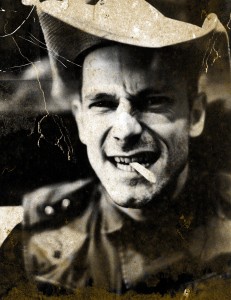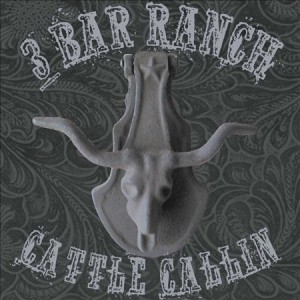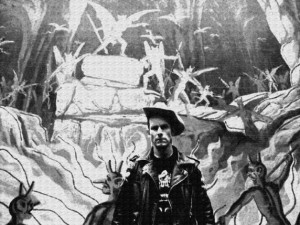Riffs, Rants & Rumors: Hank Williams III's Hankering For Metal
posted in: Country • Features • Rock
 Things could have been much easier for Shelton Hank Williams, better known as Hank Williams III, if only he was willing to play ball and give Nashville what it wanted from him. Just imagine the extent to which Hank III”who is the spitting image of his iconic grandfather ”could have cleaned up in the country market if he had offered up some polite, modern variation on grandpa’s pioneering honky-tonk sound, or even a contemporary recasting of his father’s ˜70s outlaw stylings, as Shooter Jennings has done with Waylon‘s legacy. But it was probably that very same maverick spirit Hank III inherited that kept him from pursuing the easy path to Cadillacs and caviar in Music City.
Things could have been much easier for Shelton Hank Williams, better known as Hank Williams III, if only he was willing to play ball and give Nashville what it wanted from him. Just imagine the extent to which Hank III”who is the spitting image of his iconic grandfather ”could have cleaned up in the country market if he had offered up some polite, modern variation on grandpa’s pioneering honky-tonk sound, or even a contemporary recasting of his father’s ˜70s outlaw stylings, as Shooter Jennings has done with Waylon‘s legacy. But it was probably that very same maverick spirit Hank III inherited that kept him from pursuing the easy path to Cadillacs and caviar in Music City.
You see, while Hank III does indeed have a deep love of”and aptitude for”country music, and a healthy respect for his family tradition, he’s just as heavily inspired by metal and punk, and he’s never stopped trying to honor all of his inspirations, sometimes simultaneously. That’s what has now led him to release no less than four different album projects simultaneously, each one representing a different side of his fearlessly fragmented musical personality.

According to the thirty-eight-year-old singer/songwriter/multi-instrumentalist, rock & roll grabbed him at an early age. I got my first drum kit when I was seven or eightyears old, he remembers, and I would get excited when I would hear Heart or Ted Nugent or ZZ Top or Elvis, and run around the room. I always felt connected to that kind of music because of being a drummer and feeling the beat. As he got older, he went on to develop a passion for hardcore punk and heavy metal, and Hank eventually wound up playing bass with Superjoint Ritual, Pantera frontman Phil Anselmo‘s punk-metal side project. When you’re on stage with Anselmo, there’s wild stuff happening, he says. I was working with one of my heroes, man. That’s always an honor and a trip. But every time I would take the stage with Superjoint my job was to bang my neck as hard as I could every show and take it to the next level, and that’s what I tried to do for them.
Hank also has a deep love for the slower, sludgier sound of doom-metal bands like Sleep and High On Fire, and he professes an unabashed degree of fandom for them, to the extent that he collects the gear Sleep used in the ˜90s. Right now what I’m super-proud of is I’ve collected all of Sleep’s green cabinets that were used on the Jerusalem records and all the Sleep tours, and I’ve got a couple of old heads that were [Sleep guitarist] Matt Pike’s, and I’ve reunited Al’s [bass player Cisnero] bass cabinets and Matt’s green guitar cabinets all together going through my guitar rig, so the Sleep family is back on the road as far as the gear goes. It shouldn’t come as too much of a surprise, then, that one of his new albums is a doom-rock project, Attention Deficit Domination. I’m nowhere like Sleep at all, he allows, we pay a little respect at the beginning of ADD, because they played a big [inspirational] part, and The Melvins, and Earthride, all these bands have been big influences. And for me it’s a joy to be able to slow down and feel everything, and get heavy for a bit. I haven’t had the opportunity to just chomp on the guitar as much.
 But it’s on his 3 Bar Ranch Cattle Callin’ album that Hank really seems to have topped himself by going so far as to invent a brand new genre: cattlecore. He recorded excerpts of real-life cattle auctioneers reeling off their high-speed spiels, and surrounded them with an eccentric variation on metalcore to create an eccentric new musical paradigm. The cattlecore was a lot of fun, he says. I was raised on a cattle farm¦I’ve herded ˜em, I’ve dragged the dead ones off to the side of the field and I’ve gone to the auction barn with my granddad [not Hank I, who died long before Shelton Hank was born], so I know all about it. He figures he was partly influenced by the fascination with the speed of a lot of the auctioneers. And being a drummer myself, it just seemed like a fit, because rhythmically, they’re doing a certain kind of beat. And being a singer and knowing how much focus has to go into that, I just identified with it. It was a lot of fun capturing that and playing along to it.
But it’s on his 3 Bar Ranch Cattle Callin’ album that Hank really seems to have topped himself by going so far as to invent a brand new genre: cattlecore. He recorded excerpts of real-life cattle auctioneers reeling off their high-speed spiels, and surrounded them with an eccentric variation on metalcore to create an eccentric new musical paradigm. The cattlecore was a lot of fun, he says. I was raised on a cattle farm¦I’ve herded ˜em, I’ve dragged the dead ones off to the side of the field and I’ve gone to the auction barn with my granddad [not Hank I, who died long before Shelton Hank was born], so I know all about it. He figures he was partly influenced by the fascination with the speed of a lot of the auctioneers. And being a drummer myself, it just seemed like a fit, because rhythmically, they’re doing a certain kind of beat. And being a singer and knowing how much focus has to go into that, I just identified with it. It was a lot of fun capturing that and playing along to it.
Albums three and four are actually two halves of a double-album set, Ghost to a Ghost and Gutter Town. And while they’re as close to country as Hank seems willing to get right now, let’s just say it’s alt country with a severe emphasis on the alt. Suffice to say that any album that comfortably accommodates guest contributions from both Tom Waits and Primus‘s Les Claypool isn’t likely to get Nashville’s tail wagging anytime soon. These records however, are the only ones where Hank decided to bring in other players, instead of covering everything himself, which he does on the other albums because, as he says, The metal stuff, I can pull all that off, now the country stuff I can’t, I can’t take a [guitar] solo that’s like Johnny Hiland, I can’t play fiddle like Billy Contreras. That’s the main reason. I know how to make rock records and make ˜em big and do my thing. But part of it’s the fun of having people come in, and seeing Johnny Hiland again and hearing some old stories.
 One can only imagine the stories Hank could have heard when Tom Waits popped in to do his thing. Asked how the connection came about, Hank says, He had been to a couple of shows of mine and seen what I was doing. We talked on the phone a little bit¦I got to go to his farm and sit down with him and meet the family, and talk to him, and he got to just get a feel for me. When I was making the records, I called him up and said, ‘Well I’ve got this song in mind [Fading Moon] and I hear you on it.’ For me it was just an honor.”
One can only imagine the stories Hank could have heard when Tom Waits popped in to do his thing. Asked how the connection came about, Hank says, He had been to a couple of shows of mine and seen what I was doing. We talked on the phone a little bit¦I got to go to his farm and sit down with him and meet the family, and talk to him, and he got to just get a feel for me. When I was making the records, I called him up and said, ‘Well I’ve got this song in mind [Fading Moon] and I hear you on it.’ For me it was just an honor.”
Looking at all the left turns Hank continues to take in his career, it’s hard to help wondering whether he’s trying to avoid the noose of the Hank Williams legacy or if, in an unintentional way, he’s simply living up to it by refusing to kowtow to convention. I’ve just had to march to my own drumbeat, he says. I’m a fan of Hank Williams, I never knew the man. I’m a fan just like anybody else. Hank Jr., I’ve got to be around him a little bit, but I try not to look at it like comparing myself to the family, I just try to do what I do, and do it the best that I can. A lot of that’s inspiration from Henry Rollins and [former Dead Kennedys singer] Jello Biafra and Buzz [of the Melvins] and all these people. It’s not just a family thing”I’m wanting to make my musician heroes proud. I’ve never seen a dollar of the Hank Williams estate, and I’ve had to carve my own niche. For me, playing in a bar has kept it real, and I can do my show and say hello and make the fans feel connected to me. And if I ever did have a big hit, well, we might play the same bar two or three nights in a row.
